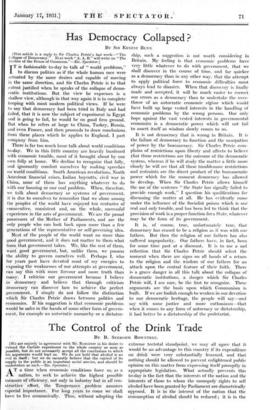Has Democracy Collapsed ?
BY SIR ERNEST BENS'
[This article is a reply to Sir Charles Petrie's: last week—" The Collapse of Democracy." Dlext week" A. A. B." will write on "The Decline of the House of Comnions."—Eb.-S.Oeciator.].
IT is fashionable to-day to talk of "world problems," 1 to discuss politics • as if the whole human race were actuated by the same desires and Capable of moving in the same direction, and Sir Charles Petrie is to• that extent justified when he speaks of the collapse of demo- cratic institutions. But the view he expresses is a shallow view, although in that way again it is in complete keeping With most modern political views. If 'he' were to say that democracy had been tried in Italy and had failed, that it is now the subject of experiment in Egypt and is going to 'fail, he would be' On *good firm ground. But When he refers at large to China, Turkey, nusSia, and even France, and then proceeds to draw conclusions from these places which he applies to England, I part company from him.
There is far too much loose talk about world 'Conditions to-day. We in this little country are heavily burdened with economic 'trouble, most of it brought about by our own folly at home. We decline to recognize that folly, and ignorantly Comfort ourselves by making 'speeches on South American revolutions, North Itherican financial crises, Indian boycotts; civil war in Chine., none of them ' has ankthing whatever to do with our housing oi our coal problem. When, 'therefore, we talk about democracy or systems of government, it is due to ourselves to remember that we 'alone among the peoples of the world have enjoyed ten centuries Of consecutive, *consistent and, on the whOlc, successful experience in the arts of government. We are the proud possessor's of the Mother of Parliaments, and are 'the only pep' pie who can look back upon more than a few generations of the 'rePresentative or self-governing idea.
Most of the people "of: the world want no More thin good government,-and it' does not matter to them Whit form that government lakes.' We, like the rest of their), wint-. good government,' but, unlike them,' we possess the ability to govern Ourselves *ell. Perhaps I, who for yeati past have devoted : most of my :energies to exposing the weaknesses of our attempts at govemnient, can say this with more fervour and more truth than rainy. I criticize our government because I belieVe in democracy and believe that through criticism democracy can discover' ho* to 'achieve the perfect governthent. I simply do not follow the distinetiOn which Sir Charles Petrie' draws between politics and economics. If his suggestion is that economic problems would be safer in the hands: Of some other form of govern- ment, for example an autocratic monarchy or a 'dictator- ship, such a suggestion is not worth considering in Britain. My feeling is that economic problems have very little whatever to do with government, that we shall discover in the course of time, and far quicker as a democracy than in any other way, that the attempt to apply political force to economic difficulties must always lead to disaster. When that discovery is finally made and accepted, it will be much easier to correct our errors as a democracy than to undertake the over- throw of an autocratic economic regime which would have built up large vested interests in the handling of economic problems by the wrong persons. Our only hope against the vast vested interests in governmental economics is a democratic power which will not fail to assert itself as wisdom slowly comes to us.
It is not democracy that is wiling in Britain. It is the failure of democracy to function and the usurpation of -power by the bureaucracy. Sir Charles Petrie com- plains of restrictions upon- liberty and affects to believe that these restrictions are the outcome Of the democratic system, whereas if he will study the matter a little more closely he will see that all these troublesome restrictions and restraints are the direct product of the bureaucratic power which for the moment democracy has allowed to develop. When Sir Charles Petrie allows himself the use of the sentence "the State has signally failed to provide enough work,". I question his qualifications for discussing the matter at all. He has evidently come under the. influence of the Socialist poison which is our real and only trouble, and has been led to think that the provision of work is a proper function for a State, whatever may be the form of its government.
It is, of course, true, unfortunately true, that democracy has ceased to be a religion as it was with our fathers. But then the religion of our fathers has also suffered unpopularity. Our fathers have, in fact, been for some time past at a discount. It is to me a sad reflection that Sir Charles Petrie should select the moment when there are signs on all hands of a return to the religion and the wisdom of our fathers for an attack upon the central feature of their faith. There is a grave danger in all this talk about the collapse of democratic institutions, a: danger which Sir Charles Petrie will, I am' sure, be the first to recognize. These arguments are *the basis upon which Communism is built. If we are foolish enough to weaken in our devotion to our democratic heritage, the people will say—and say with some justice and more enthusiasm—that when it comes to any form of autocracy or dictatorship, it had better be a dictatorship of the proletariat.




































 Previous page
Previous page